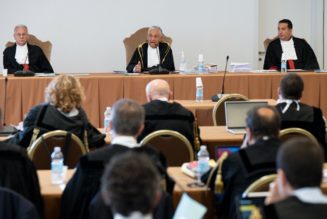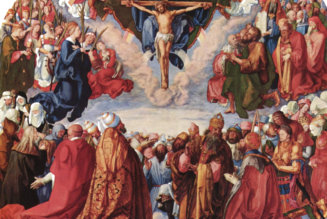By Dr. Jeff Mirus ( bio – articles – email ) | Oct 04, 2022
We need look no further than three stories in today’s news to realize once again that the Catholic Church is in crisis. But we might have to read between the lines to get the message.
US Catholics want different presidential candidates, poll finds
It is not surprising that nominal Catholics are divided on President Biden, considering he heads what is historically the American administration most hostile by far to Catholic moral principles. Among those who attend Mass regularly, the disapproval of the Biden Administration rises to 75%, but surely the percentage of active Catholics who abhor the Biden Administration ought to be something like one hundred percent.
Those looking for political silver linings for the next Presidential election will be encouraged by this latest poll, because American politics is typically in such a state that a hair’s breadth marks the difference between muddling along and falling into even more serious evils. But the real problem is that so many decidedly uncommitted Catholics—I mean uncommitted religiously—must be taken into account in the polling process. A Church in which only a shade over 50% of those who claim affiliation are discontented with Joseph Biden’s leadership is a Church in which roughly half of its members are seriously disenfranchised from Jesus Christ.
When we consider how many still bandy about the Catholic name without any significant spiritual commitment, the numbers do become slightly more palatable. But this is an absurd position for the Church—the position of having those without a spiritual commitment to Catholicism showing up in poll after poll after poll. We are talking largely about non-practicing Catholics here—not only in terms of regular Sunday Mass attendance but in terms of acceptance of the contents of the Catholic Faith.
Every bishop (not to mention the USCCB as a whole) should be focusing on this problem. Every bishop should set everything else aside in favor of deliberately fostering a muscular Catholicism which presents a united front of faith, morals, and mercy. To take just one contrary indicator, very relevant to the political concerns with which this commentary began, it is astonishing how long it has taken to shake the bishops of the United States out of their penchant for public policy statements and into a whirlwind of authentic Catholic renewal. Of course, when I say “how long it has taken”, I mean that it has not happened yet in a great many (most?) dioceses in the United States.
Vatican cardinal, unwelcome in Germany, cancels visit
It turns out that Cardinal Kurt Koch, president of the Dicastery for Christian Unity, has decided to cancel his plans for a visit to Germany, at least partially because he has so deeply offended those bishops who are dead set on a heterodox synodal path. I admit that the Germans are rightly sensitive to Cardinal Koch’s earlier references to Nazism in connection with the German Synodal Path, but that sensitivity among secularized German Catholics is badly used if they do not realize that the blatant secularism guiding the synodal process in Germany—the blatant disregard of the truths of Catholic faith and morals—actually does mirror the blatant secularism championed by Hitler and the Nazis.
This does not mean they are the same thing. But the evil root of Nazism was not its particular atrocities but its Satanic commitment to dehumanization in the name of power, and its erection of a standard of unity based on the desire to substitute lies about human nature for reality itself. This, of course, is the grave problem which underlies all totalitarianisms, and the synodal path in Germany today leads to exactly the same destination—the reinvention of human nature and human empowerment so that it is no longer possible for men and women to honor in their own bodies the image of God in which they were formed by Divine Love.
The rejection of nature, and in particular of our own bodily nature, in the illusive search for happiness apart from God’s plan has made very deep inroads into the Church. While it takes a distinctively modern and technologically manipulative form, this governing illusion strongly mimics ancient paganism. If we look at the Nazi ideology closely we see immediately that it too was deeply rooted in pagan ideas and myths. For this reason, Cardinal Koch was undoubtedly correct when he noted that, like the Synodal Path as it has unfolded in Germany, so too did Nazism seek new sources for Christianity, rejecting Scripture and Tradition.
Hence the outcry, including from the president of the German episcopal conference, and the threats of violence against Cardinal Koch if he did not cancel his trip. But the problem extends far beyond Germany. We are, after all, seeing in each and every country’s reports on its own synodal discussions that a significant number of participants prefer new sources of Catholicism to Scripture, Tradition, and the Magisterium of the Church. The only unresolved question is whether synodality is (a) a brilliant stroke by Pope Francis to reveal the rot and put counter-measures in place; (b) a deliberate effort from the top to minimize the safeguards which have been built into the very nature of the Catholic Church; or (c) just more of the same old modern democratic secular muddle, in which people are rendered powerless against evil in return for being given a voice and a vote.
Witnesses in Vatican mega trial paint bleak picture of how Secretariat managed funds
As all observers knew they would be, the Vatican financial trials have proven to be a showcase for an organization that might be named something like “Catholics for Profit”. There has been a great deal of reshuffling over the centuries of Vatican departments and the relationships among them—and plenty just within my own lifetime. The lesson, as with all bureaucracies, is that the more things change the more they remain the same. Indeed, the effort to add administrative apparatus to improve the efficiency of any regime always carries within it at least the seeds of its own destruction.
The substitute for personal rule is always bureaucratic rule, and bureaucratic rule always invites two debilitating evils because of the personal anonymity fostered by all its layers, policies, and procedures. These evils are (a) inefficiency, because of the sheer weight of the institutional arrangements; and (b) the abuse of positions for gain by those who know how to manipulate the sheer weight of the institutional arrangements. The modern Vatican administration, therefore, has suffered the same problems that plague all bureaucratic states, though obviously featuring a far smaller number of players and a higher general expectation of rectitude as compared with national governments.
Similar problems, on a smaller scale, plague centralized episcopal conferences—for example in the allocation of grants. But the point is that, while abuse of power is possible wherever power is wielded, bureaucratic structures lend anonymity to those who know how to manipulate the system through all its multifarious layers and interconnections. In other words, the Vatican administration presents temptations to career bureaucrats, and they are not protected from these temptations by the objective value of being Catholic, or ordained, or raised to an influential position in the bureaucratic jumble. In financial affairs things become even more layered, with the involvement of numerous experts and money-handling institutions which can be leveraged in complex international deals.
In other words, bureaucracies are first and foremost inefficient, but one of their secondary features is that their structures and interconnections can easily become obscure, so that it is depressingly easy to shift both accountability and blame. Both subterfuge and finger-pointing can become a way of life, and it can take a major trial—with the inevitable gigantic investments of time and funds that such an investigative and legal process entails—to unravel all the connections and so determine who authorized what, and how, and why.
Is there a moral?
A certain amount of institutional weight and stability is good, obviously, since we ought to try to make the Catholic presence in each part of the world a strong and enduring presence. But the Divine Constitution of the Church describes administration in terms of the pope, bishops, pastors, and deacons. In theory, bureaucratic offices are established to assist the pope, the bishop, and the pastor in carrying out their Divine missions. In practice, they have a tendency to permanentize themselves and become obstacles to the personal efficacy that is otherwise built into personal mission.
If synodality is to mean anything, it must mean a restoration of the sense of personal mission that is supposed to characterize not only every Catholic but every Catholic office. All adult Catholics have been sacramentally baptized and confirmed for personal mission. Most Catholics have been sacramentally strengthened also for a particular mission within their overall Christian mission. The word “office” derives from the Latin officium which includes the concepts of duty, obligation, service and kindness. Apart from the related sense of the term as an ordered ritual of prayer, the Catholic understanding of “office” always has the sense of a personal commission. It is never merely a layer of “management” or “bureaucracy”, and it is always missionary in the sense of realizing a particular good for others, a good for which one takes responsibility in the name of Christ and the Church.
The one who betrays this “office” betrays the Church, the Faith, and Christ Himself. Thus it was that Peter himself stood up in the midst of the apostles and disciples and spoke of the need to to find another to fulfill the office of Judas:
For he was numbered among us, and was allotted his share in this ministry….For it is written in the book of Psalms, “Let his habitation become desolate, and let there be no one to live in it”; and “His office let another take.” [cf. the entire passage, Acts 1:15-26]
In our time the Church must dramatically improve her understanding of Catholic duty, of Catholic office, and of the Divinely ordained personal missionary character of each and every office. For each office, along with every gift, is established and conferred for the building up of the Mystical Body of Christ.
Sound Off! CatholicCulture.org supporters weigh in.
All comments are moderated. To lighten our editing burden, only current donors are allowed to Sound Off. If you are a current donor, log in to see the comment form; otherwise please support our work, and Sound Off!

There are no comments yet for this item.
Join Our Telegram Group : Salvation & Prosperity









